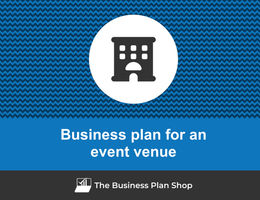How to create a financial forecast for an event venue?
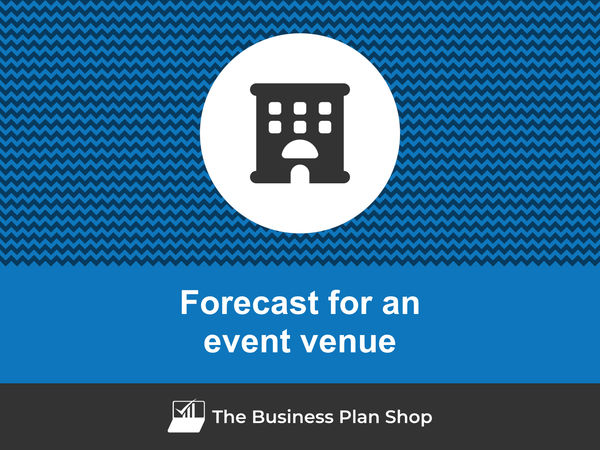
Creating a financial forecast for your event venue, and ensuring it stays up to date, is the only way to maintain visibility on future cash flows.
This might sound complex, but with the right guidance and tools, creating an accurate financial forecast for your event venue is not that hard.
In this guide, we'll cover everything from the main goal of a financial projection, the data you need as input, to the tables that compose it, and the tools that can help you build a forecast efficiently.
Without further ado, let us begin!
Why create and maintain a financial forecast for an event venue?
In order to prosper, your business needs to have visibility on what lies ahead and the right financial resources to grow. This is where having a financial forecast for your event venue becomes handy.
Creating an event venue financial forecast forces you to take stock of where your business stands and where you want it to go.
Once you have clarity on the destination, you will need to draw up a plan to get there and assess what it means in terms of future profitability and cash flows for your event venue.
Having this clear plan in place will give you the confidence needed to move forward with your business’s development.
Having an up-to-date financial forecast for an event venue is also useful if your trading environment worsens, as the forecast enables you to adjust to your new market conditions and anticipate any potential cash shortfall.
Finally, your event venue's financial projections will also help you secure financing, as banks and investors alike will want to see accurate projections before agreeing to finance your business.
Need a convincing business plan?
The Business Plan Shop makes it easy to create a financial forecast to assess the potential profitability of your projects, and write a business plan that’ll wow investors.

What information is used as input to build an event venue financial forecast?
A event venue's financial forecast is only as good as the inputs used to build it.
If you are creating (or updating) the forecast of an existing event venue, then you mostly need your accounting information, key historical operating non-financial data, and your team’s input on what to expect for the coming years.
If you are building financial projections for an event venue startup, you will need to have done your research and have a clear picture of your competitive environment and go-to-market strategy so that you can forecast sales accurately.
For a new venture, you will also need a precise list of the resources needed to keep the event venue running on a day-to-day basis and a list of the equipment and expenditures required to start the business (more on that later).
Let's now take a closer look at the elements that make up your event venue's financial forecast.
The sales forecast for an event venue
From experience, it usually makes sense to start your event venue's financial projection with the revenues forecast.
The inputs used to forecast your sales will include the historical trading data of your event venue (which can be used as a starting point for existing businesses) and the data collected in your market research (which both new ventures and existing businesses need to project their sales forward).
Your event venue's sales forecast can be broken down into two key estimates:
- The average price
- The number of monthly transactions
To assess these variables accurately, you will need to consider the following factors:
- Special Events: The number of special events such as weddings, corporate events, and birthday parties can greatly impact your average price and number of monthly transactions. These events tend to have a higher budget and require more services, resulting in a higher average price. Additionally, if your venue is in high demand for special events, it can lead to more monthly transactions.
- Location: The location of your venue can also affect your average price and number of monthly transactions. A venue located in a popular and desirable area may be able to charge a higher price and attract more customers, resulting in an increase in both average price and monthly transactions. On the other hand, a venue in a less desirable location may struggle to attract customers and may have to lower their prices to remain competitive.
- Seasonal Demand: The demand for event venues can vary throughout the year, with certain seasons being busier than others. For example, wedding season typically falls in the summer months, so your average price and number of monthly transactions may increase during this time. On the other hand, if your venue is primarily used for outdoor events, the winter months may see a decrease in both average price and monthly transactions.
- Competition: The level of competition in your area can also impact your average price and number of monthly transactions. If there are many other event venues in close proximity, you may have to lower your prices to remain competitive and attract customers. This can result in a decrease in average price, but potentially an increase in monthly transactions if your venue is seen as a more affordable option.
- Facility Updates: Regular updates and improvements to your event venue can also affect your average price and number of monthly transactions. If you invest in new amenities or renovations that make your venue more attractive and desirable, you may be able to increase your prices and attract more customers. However, if you neglect to update your venue, it may become less appealing and lead to a decrease in both average price and monthly transactions.
Once you have a sales forecast in place, the next step will be to work on your overhead budget. Let’s have a look at that now.
Need a convincing business plan?
The Business Plan Shop makes it easy to create a financial forecast to assess the potential profitability of your projects, and write a business plan that’ll wow investors.

The operating expenses for an event venue
The next step is to estimate the expenses needed to run your event venue on a day-to-day basis.
These will vary based on the level of sales expected, and the location and size of your business.
But your event venue's operating expenses should include the following items at a minimum:
- Staff costs: This includes salaries, wages, and benefits for your event venue staff, such as event coordinators, kitchen staff, security personnel, and cleaning staff.
- Accountancy fees: You may need to hire an accountant or bookkeeper to help you with financial record keeping, tax preparation, and other financial tasks related to running your event venue.
- Insurance costs: You will need to have insurance coverage for your event venue to protect against potential risks, such as property damage, liability claims, and worker injuries.
- Software licenses: Running an event venue may require you to use various software programs for tasks such as event management, ticket sales, and marketing. Make sure to include the cost of purchasing and renewing these licenses in your operating expenses forecast.
- Banking fees: You will likely have to pay fees for various banking services, such as processing credit card payments, wire transfers, and monthly account maintenance.
- Rent/lease: If you do not own the building where your event venue is located, you will need to include the cost of rent or lease in your operating expenses. This may also include utilities and maintenance fees.
- Marketing and advertising: In order to attract clients and promote your event venue, you will need to budget for marketing and advertising costs, such as creating brochures, print ads, and digital campaigns.
- Supplies and inventory: You will need to purchase various supplies and inventory to keep your event venue running smoothly, such as food and beverages, cleaning supplies, and event decorations.
- Equipment rental: Depending on the type of events you host, you may need to rent equipment such as audiovisual equipment, tables and chairs, or tents. Make sure to include these costs in your operating expenses forecast.
- Professional fees: You may need to hire professionals, such as event planners or caterers, to help you with certain aspects of running your event venue. Include these fees in your forecast.
- Maintenance and repairs: As with any property, your event venue will require regular maintenance and occasional repairs. Budget for these costs to keep your venue in top condition.
- Utilities: You will need to pay for utilities such as electricity, water, and gas to keep your event venue functioning. Make sure to include these costs in your operating expenses.
- Taxes and licenses: Running an event venue will require you to pay various taxes and obtain necessary licenses. Make sure to budget for these expenses in your forecast.
- Cleaning services: To keep your event venue clean and presentable, you may need to hire a cleaning service. Include this cost in your operating expenses.
- Security services: Depending on the size and location of your event venue, you may need to hire security personnel to ensure the safety of your clients and guests. Make sure to budget for this expense.
This list is, of course, not exhaustive, and you'll have to adapt it according to your precise business model and size. A small event venue might not have the same level of expenditure as a larger one, for example.
What investments are needed to start or grow an event venue?
Your event venue financial forecast will also need to include the capital expenditures (aka investments in plain English) and initial working capital items required for the creation or development of your business.
For an event venue, these could include:
- Venue Space: This includes the physical space itself, such as the building or outdoor area where the event will take place. This could also include any necessary renovations or upgrades to the space to make it suitable for events.
- Furniture and Equipment: This refers to any fixed assets used for the event, such as tables, chairs, podiums, lighting, and audio-visual equipment. These items are essential for creating a functional and visually appealing event space.
- Decor and Design: This includes any decor and design elements that are necessary for the event, such as linens, centerpieces, signage, and other decorative items. These items not only enhance the overall aesthetic of the event, but they also play a role in creating a specific atmosphere or theme.
- Technology and Software: In today's digital age, having the right technology and software is crucial for running a successful event venue. This may include ticketing and registration systems, event management software, and other technology needed for event operations and communication.
- Transportation and Parking: Depending on the location of the event venue, transportation and parking may be a necessary capital expenditure. This could include shuttle services, parking lot renovations, or purchasing vehicles for transportation.
Again, this list will need to be adjusted according to the size and ambitions of your event venue.
Need a convincing business plan?
The Business Plan Shop makes it easy to create a financial forecast to assess the potential profitability of your projects, and write a business plan that’ll wow investors.

The financing plan of your event venue
The next step in the creation of your financial forecast for your event venue is to think about how you might finance your business.
You will have to assess how much capital will come from shareholders (equity) and how much can be secured through banks.
Bank loans will have to be modelled so that you can separate the interest expenses from the repayments of principal, and include all this data in your forecast.
Issuing share capital and obtaining a bank loan are two of the most common ways that entrepreneurs finance their businesses.
What tables compose the financial plan for an event venue?
Now let's have a look at the main output tables of your event venue's financial forecast.
The projected profit & loss statement
The projected profit & loss shows how profitable your event venue is likely to be in the years to come.
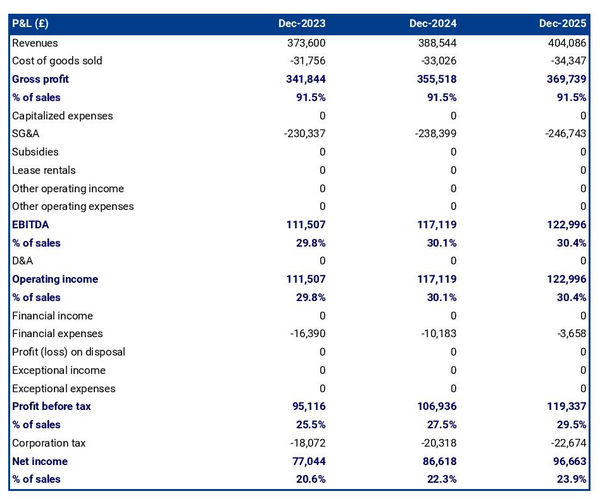
For your event venue to be financially viable, your projected P&L should ideally show:
- Sales growing above inflation (the higher the better)
- Profit margins which are stable or expanding (the higher the better)
- A net profit at the end of each financial year (the higher the better)
This is for established event venues, there is some leniency for startups which will have numbers that will look a bit different than existing businesses.
The projected balance sheet
Your event venue's projected balance sheet provides a snapshot of your business’s financial position at year-end.
It is composed of three types of elements: assets, liabilities and equity:
- Assets: represent what the business possesses including cash, equipment, and accounts receivable (money owed by clients).
- Liabilities: represent funds advanced to the business by lenders and other creditors. They include accounts payable (money owed to suppliers), taxes payable and loans from banks and financial institutions.
- Equity: is the combination of what has been invested by the business owners and the cumulative profits and losses generated by the business to date (which are called retained earnings). Equity is a proxy for the value of the owner's stake in the business.
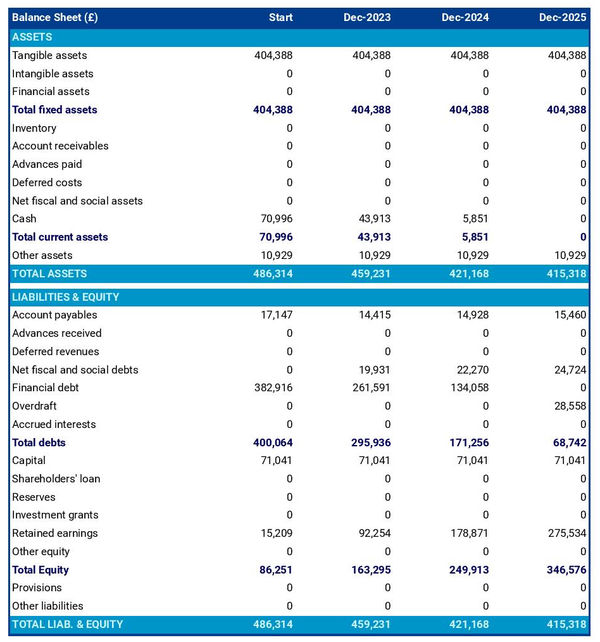
The cash flow projection
The cash flow forecast of your event venue will show how much cash the business is expected to generate or consume over the next three to five years.
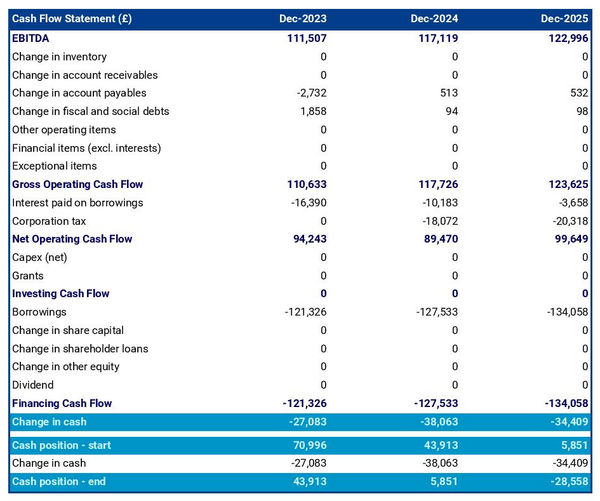
There are multiple ways of presenting a cash flow forecast but from experience, it is better to organise it by nature in order to clearly show these elements:
- Operating cash flow: how much cash is generated by the event venue's operations
- Investing cash flow: what is the business investing to expand or maintain its equipment
- Financing cash flow: is the business raising additional funds or repaying financiers (debt repayment, dividends)
Your cash flow forecast is the most important element of your overall financial projection and that’s where you should focus your attention to ensure that your event venue is adequately funded.
Note: if you are preparing a financial forecast in order to try to secure funding, you will need to include both a yearly and monthly cash flow forecast in your event venue's financial plan.
Need a convincing business plan?
The Business Plan Shop makes it easy to create a financial forecast to assess the potential profitability of your projects, and write a business plan that’ll wow investors.

Which tool should you use to create your event venue's financial forecast?
Creating your event venue's financial forecast may sound fairly daunting, but the good news is that there are several ways to go about it.
Using online financial forecasting software to build your event venue's projections
The modern and easiest way is to use professional online financial forecasting software such as the one we offer at The Business Plan Shop.
There are several advantages to using specialised software:
- You can easily create your financial forecast by letting the software take care of the financial calculations for you without errors
- You have access to complete financial forecast templates
- You get a complete financial forecast ready to be sent to your bank or investors
- You can easily track your actual financial performance against your financial forecast, and recalibrate your forecast as the year goes by
- You can create scenarios to stress test your forecast's main assumptions
- You can easily update your forecast as time goes by to maintain visibility on future cash flows
- You have a friendly support team on standby to assist you when you are stuck
- It’s cost-efficient and much cheaper than using an accountant or consultant (see below)
If you are interested in this type of solution, you can try our forecasting software for free by signing up here.
Calling in a financial consultant or chartered accountant
Outsourcing the creation of your event venue financial forecast is another possible solution.
This will cost more than using software as you can expect as your price will have to cover the accountant’s time, software cost, and profit margin.
Price can vary greatly based on the complexity of your business. For a small business, from experience, a simple three-year financial forecast (including a balance sheet, income statement, and cash flow statement) will start at around £700 or $1,000.
Bear in mind that this is for forecasts produced at a single point in time, updating or tracking your forecast against actuals will cost extra.
If you decide to outsource your forecasting:
- Make sure the professional has direct experience in your industry and is able to challenge your assumptions constructively.
- Steer away from consultants using sectorial ratios to build their client’s financial forecasts (these projections are worthless for a small business).
Why not use a spreadsheet such as Excel or Google Sheets to build your event venue's financial forecast?
You and your financial partners need numbers you can trust. Unless you have studied finance or accounting, creating a trustworthy and error-free event venue financial forecast on a spreadsheet is likely to prove challenging.
Financial modelling is very technical by nature and requires a solid grasp of accounting principles to be done without errors. This means that using spreadsheet software like Excel or Google Sheets to create accurate financial forecasts is out of reach for most business owners.
Creating forecasts in Excel is also inefficient nowadays:
- Software has advanced to the point where forecasting can be done much faster and more accurately than manually on a spreadsheet.
- With artificial intelligence, the software is capable of detecting mistakes and helping decision-making.
Spreadsheets are versatile tools but they are not tailor-made for reporting. Importing your event venue's accounting data in Excel to track actual vs. forecast is incredibly manual and tedious (and so is keeping forecasts up to date). It is much faster to use dedicated financial planning tools like The Business Plan Shop which are built specially for this.
Need a convincing business plan?
The Business Plan Shop makes it easy to create a financial forecast to assess the potential profitability of your projects, and write a business plan that’ll wow investors.

Use our financial forecast templates for inspiration
The Business Plan Shop has dozens of financial forecast examples available.
Our templates contain both a financial forecast and a written business plan which presents, in detail, the company, the team, the strategy, and the medium-term objectives.
Our templates are a great source of inspiration, whether you just want to see what a complete business plan looks like, or are looking for concrete examples of how you should model financial elements in your own forecast.
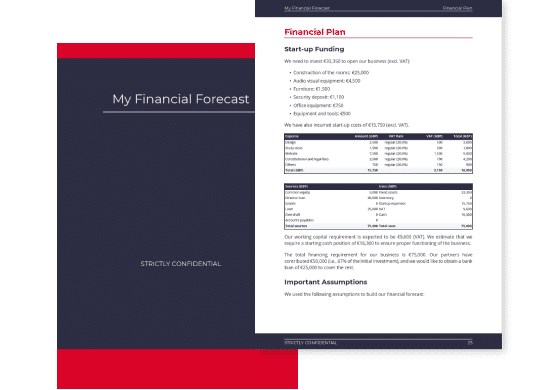
Takeaways
- A financial forecast shows expected growth, profitability, and cash generation metrics for your event venue.
- Tracking actuals vs. forecast and having an up-to-date financial forecast is key to maintaining visibility on your future cash flows.
- Using financial forecasting software is the modern way of creating and maintaining financial projections.
We hope that this guide helped you gain a clearer perspective on the steps needed to create the financial forecast for an event venue. Don't hesitate to contact us if you have any questions!
Need a convincing business plan?
The Business Plan Shop makes it easy to create a financial forecast to assess the potential profitability of your projects, and write a business plan that’ll wow investors.

Also on The Business Plan Shop
- Financial forecast example
- How to create a sales forecast for a business?
- Example of financial forecast for business idea
Know someone who runs an event venue? Share our business guide with them!


